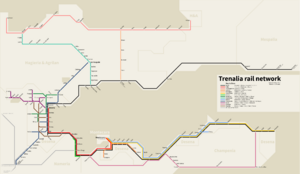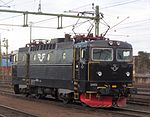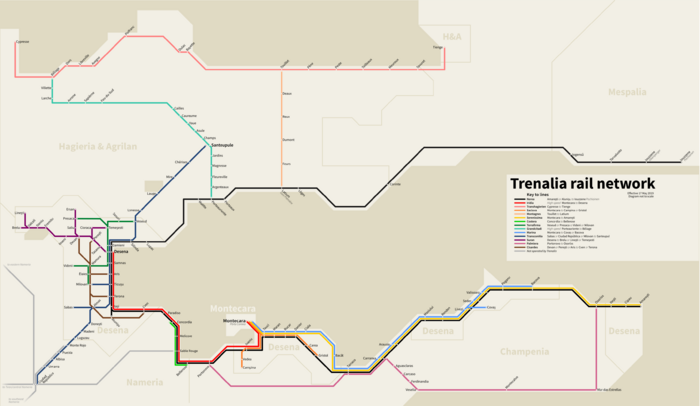User:Montecara/Sandbox/Trenalia: Difference between revisions
| Line 162: | Line 162: | ||
=== Second class === | === Second class === | ||
[[File: | [[File:Trenalia-double2|300px|thumbnail|A second-class double compartment configured for nighttime]] | ||
==== Seating ==== | ==== Seating ==== | ||
Second-class seats are slightly narrower than first-class ones, with four seats per row rather than three in open carriages and pairs of three seats each in compartment carriages. They are generally equipped with folding tray tables. Drinks, snacks, and meals are available for purchase in the bar or dining car. | Second-class seats are slightly narrower than first-class ones, with four seats per row rather than three in open carriages and pairs of three seats each in compartment carriages. They are generally equipped with folding tray tables. Drinks, snacks, and meals are available for purchase in the bar or dining car. | ||
Revision as of 19:21, 18 June 2019
 | |
 Network map | |
| Reporting mark | TNA |
|---|---|
| Locale | Southeastern Conitia |
| Dates of operation | 1978–present |
| Track gauge | 1,500 mm |
| Electrification | 25 kV / 50 Hz AC |
| Headquarters | Montecara |
| Website | trenalia.co |
Trenalia is an international passenger rail and rail services company serving southeastern Conitia. It is jointly owned by the states of Montecara, Nameria, Champenia, Hagieria and Agrilan, Mespalia, and the Desenan Republic. The company's headquarters is located at Montecara Pòrta Conìxia railway station.
History and ownership
Ownership of Trenalia since 2001
Rail transport had been a key component of the inter-city transport system in southeast Conitia since the heyday of steam trains in the mid to late 19th century. By the 1950s, however, consolidation and rising capital costs as well as stock manipulation had made many smaller railways unprofitable. This trend accelerated over the next two decades, worsened by the advent of affordable air travel, and by the mid-1970s it was clear that passenger rail in the region was in crisis. Rail companies appealed to the state for help, and the governments of Montecara and the Desenan Republic responded by making a buyout offer to a consortium of railroad companies to take effect in 1978. The deal went through, and Trenalia was born on paper as the sole inter-city rail operator in the two countries.
Trenalia began operation on 7 March 1980 with service in Montecara and the Desenan Republic. Over the next two decades, the company’s financial viability and economy of scale convinced other states in the region to buy into the company and allow Trenalia to operate inter-city routes in their countries as well. By 1998, the company had extended operations to Nameria, Champenia, and Hagieria and Agrilan. The extension to Mespalia was completed in 2000.
States with Trenalia service are required to buy stock in the company when operations commence and to guarantee debt coverage in the event of budget shortfalls.
Divisions and subsidiaries
Trenalia is organized primarily into two operating divisions: Trenalia Nord and Trenalia Sud. These divisions are separated by the Lazarene Sea and are not connected to each other. Rolling stock and other equipment must be ferried across the sea as needed.
In addition to its core passenger-rail business, Trenalia operates a number of subsidiaries that cover other aspects of the rail transport industry. Trenalia Cargo conducts freight rail operations and Trenalia Infra manages the construction and maintenance of rail infrastructure.
Marketing
Trenalia has heavily used the song “Co te partirò” by Montecaran singer Andrà Boxèli since its debut in 1998. The song’s title, which translates to “I’ll go with you,” has been used as the company’s advertising tagline for over twenty years.
Routes and lines
Trenalia services include high-speed, higher-speed, and conventional-speed rail. Night trains (except for high-speed services) often operate with attached sleeping cars which are detached when they reach their intended destination in the morning.
Trenalia organizes its services into the following lines:
| Line | Type | Termini |
|---|---|---|
| Nerea | Inter-city rail | Amarești/Alunișu — Iouzzene (Pochiainen) |
| Iridia | High-speed rail | Montecara — Desena |
| Transhagierien | Inter-city rail | Cypresse — Tienge |
| Saciuva | Inter-city rail | Montecara — Campina/Gristol |
| Montagnes | Inter-city rail | Touillet — Latium |
| Serenissima | Higher-speed rail | Montecara — Valisoara |
| Costera | Inter-city rail | Concordia — Bellerose |
| Terrafirma | Inter-city rail | Veseud/Presaca — Videni/Milovan |
| Grandcitadi | High-speed rail | Porteauriente — Béliage |
| Marina | Inter-city rail | Montecara — Bacova |
| Transconitia | Inter-city rail | Sabas/Ciudad República/Milovan — Santeupul |
| Suran | Inter-city rail | Desena — Brelu/Linești/Timeșesti |
| Palmiera | Inter-city rail | Portonovo — Osoríos |
| Cisardes | Inter-city rail | Devan/Perești/Aris — Cven/Terona |
Service levels
Train services are divided into the following levels based on speed and coverage:
- Ultra: High-speed rail operating on dedicated railway at a maximum speed of 380 km/h.
- Exprima: Intercity higher-speed rail stopping only at major stations.
- Direta: Longer-distance trains that skip small stations. They may run equipment with faster running speeds than Rexio trains.
- Rexio: Trains stop at all stations and, on longer lines, may run shorter routes that do not go the full length of the line.
Classes of service
First class
All first-class tickets come with access to first-class waiting rooms at stations where available. Aboard the train, first-class passengers enjoy complimentary snacks and drinks, newspapers and magazines, and access to dedicated lounge and dining cars and meeting rooms on select trains.
Seating
Trenalia uses several different seating configurations in its carriages. On trains with open-carriage seating, first-class seats are arranged three to a row and generally face forward aside from a few sets of two or four facing each other at the ends of carriages.
On trains with compartment seating, first-class compartments seat four, arranged in two pairs of seats facing each other.
All first-class seats come with a table, reading lamp, and attendant call button.
Single sleeper
A private room for a single traveler, first-class single sleepers come with a private toilet, shower, and sink. The bed converts to a couch and table for daytime use, and an attendant is on call to bring meals, drinks, and snacks and provide turndown service.
Double sleeper
First-class double sleepers accommodate two and may be booked whole or by a single traveler, in which case they are single-sex. Like the single sleepers, they come with private toilet, shower, and sink, and an attendant is on call to bring meals, drinks, and snacks and provide turndown service.
Second class
Seating
Second-class seats are slightly narrower than first-class ones, with four seats per row rather than three in open carriages and pairs of three seats each in compartment carriages. They are generally equipped with folding tray tables. Drinks, snacks, and meals are available for purchase in the bar or dining car.
Double sleeper
Second-class double compartments can be booked whole or by a single traveler, in which case they are single-sex. They have a private sink and share toilets with the rest of the carriage.
Quartet
Couchette car with space for four travelers per compartment. They are usually mixed-sex, but trains generally have at least one women's-only quartet, and groups may reserve the entire compartment. They have a private sink and share toilets with the rest of the carriage.
Reservations
Reservations are required for single sleepers but are optional for all other tickets. Reserving a seat incurs a small additional charge.
Fares and ticketing
Trenalia uses a complex fare structure based on distance, date and time, service class, train type, how far in advance the ticket is booked, and other factors.
Cartalia is Trenalia's discount card, available in three versions: Cartalia25, Cartalia50, and Cartalia100. The first two offer discounts of 25% and 50% respectively on all tickets; the last allows for unlimited travel on the entire rail network excluding sleepers, which require a small additional payment.
Rolling stock
| Image | Type | Class | Services | Max. speed | Notes |
|---|---|---|---|---|---|

|
Electric multiple unit | Zefiro | Ultra | 380 km/h | Entered service 2012–2019. |

|
Electric multiple unit | 802 | Exprima | 225 km/h | Entered service 2018. |

|
Electric multiple unit | X55 | Exprima | 200 km/h | Entered service 2000–2013. |

|
Electric locomotive | X2 | Exprima, Direta | 200 km/h | Entered service 1989–1998. Refurbished 2003–2007 and 2018–2020. |

|
Electric multiple unit | X40 | Rexio | 200 km/h | Double-deck coaches. Entered service 2006–2019. |

|
Electric locomotive | Rc | Rexio | 160 km/h | Entered service 1967–1988. |


